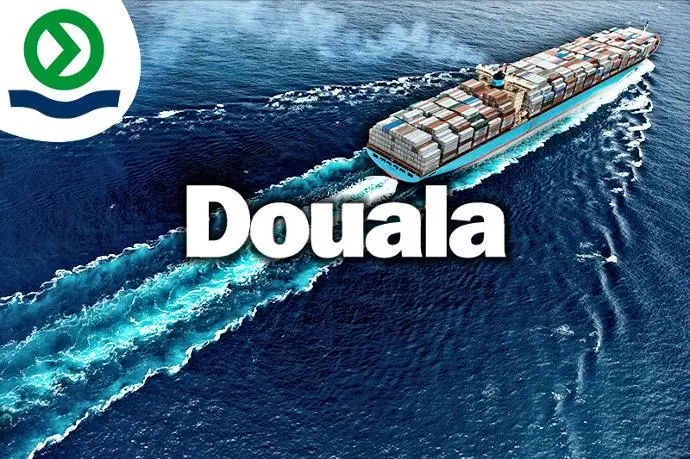Kribi's Giant Leap:
Cameroon’s Mega Port Sets Sail for Prosperity Amid Local Tensions
Cameroon has recently inaugurated the second phase of the Kribi Deep Seaport, positioning it as the largest port in Central Africa. Constructed by China Harbor Engineering Company (CHEC), this expansion aims to bolster the nation's economic landscape by enhancing trade capabilities and attracting foreign investment, however concerns from local communities have risen.
The upgraded port now features a 715-meter quay, advanced handling equipment, and the capacity to accommodate ultra-large container ships such as the MSC Türkiye, which has a capacity of 24,346 TEU. This development is expected to significantly reduce turnaround times and double the port's handling capacity, solidifying Kribi's status as a key maritime hub in the Gulf of Guinea.
Beyond infrastructure, the port's expansion is anticipated to create over 300 direct jobs and stimulate economic exchanges throughout the subregion. The strategic location and modern facilities are poised to play a pivotal role in enhancing trade and economic growth in Cameroon and the broader Central African region.
However, the project's advancement has not been without challenges. Local communities, particularly in the village of Lolabe, have expressed concerns over displacement and inadequate compensation. Reports indicate that land laws in Cameroon are ambiguous, leading to disputes over property rights and compensation.
Environmental concerns have also surfaced. The port's construction has intensified coastal erosion and increased pollution, adversely affecting marine life and the livelihoods of local fishermen. The proximity of the port to Cameroon's only marine protected area raises further ecological concerns.
In response to some of these issues, CHEC has undertaken corporate social responsibility initiatives, including the construction of roads, bridges, and the installation of solar panels in nearby villages. These efforts aim to improve local infrastructure and living conditions.
As Cameroon navigates the complexities of rapid development, the Kribi Deep Seaport stands as both a beacon of economic potential and a reminder of the importance of inclusive and sustainable growth.
A BESC (Bordereau Électronique de Suivi des Cargaisons) is mandatory for all shipments to Cameroon.
The R&C Desk simplifies the process and provides efficient assistance to comply with the latest requirements.
For further assistance, the R&C Desk website is available 24/7.
Cameroon has recently inaugurated the second phase of the Kribi Deep Seaport, positioning it as the largest port in Central Africa. Constructed by China Harbor Engineering Company (CHEC), this expansion aims to bolster the nation's economic landscape by enhancing trade capabilities and attracting foreign investment, however concerns from local communities have risen.
The upgraded port now features a 715-meter quay, advanced handling equipment, and the capacity to accommodate ultra-large container ships such as the MSC Türkiye, which has a capacity of 24,346 TEU. This development is expected to significantly reduce turnaround times and double the port's handling capacity, solidifying Kribi's status as a key maritime hub in the Gulf of Guinea.
Beyond infrastructure, the port's expansion is anticipated to create over 300 direct jobs and stimulate economic exchanges throughout the subregion. The strategic location and modern facilities are poised to play a pivotal role in enhancing trade and economic growth in Cameroon and the broader Central African region.
However, the project's advancement has not been without challenges. Local communities, particularly in the village of Lolabe, have expressed concerns over displacement and inadequate compensation. Reports indicate that land laws in Cameroon are ambiguous, leading to disputes over property rights and compensation.
Environmental concerns have also surfaced. The port's construction has intensified coastal erosion and increased pollution, adversely affecting marine life and the livelihoods of local fishermen. The proximity of the port to Cameroon's only marine protected area raises further ecological concerns.
In response to some of these issues, CHEC has undertaken corporate social responsibility initiatives, including the construction of roads, bridges, and the installation of solar panels in nearby villages. These efforts aim to improve local infrastructure and living conditions.
As Cameroon navigates the complexities of rapid development, the Kribi Deep Seaport stands as both a beacon of economic potential and a reminder of the importance of inclusive and sustainable growth.
A BESC (Bordereau Électronique de Suivi des Cargaisons) is mandatory for all shipments to Cameroon.
The R&C Desk simplifies the process and provides efficient assistance to comply with the latest requirements.
For further assistance, the R&C Desk website is available 24/7.
Get your BIETC/ECTN/
BESC/Waiver/Certificate for Cameroon!
Stay on up to date of all regulations!
Sources
english.news.cn | chinaglobalsouth.com
Image by R&C Desk
What are you waiting for?
Let us make sure that you have the correct Electronical Cargo Tracking Note for you shipment!
Login
